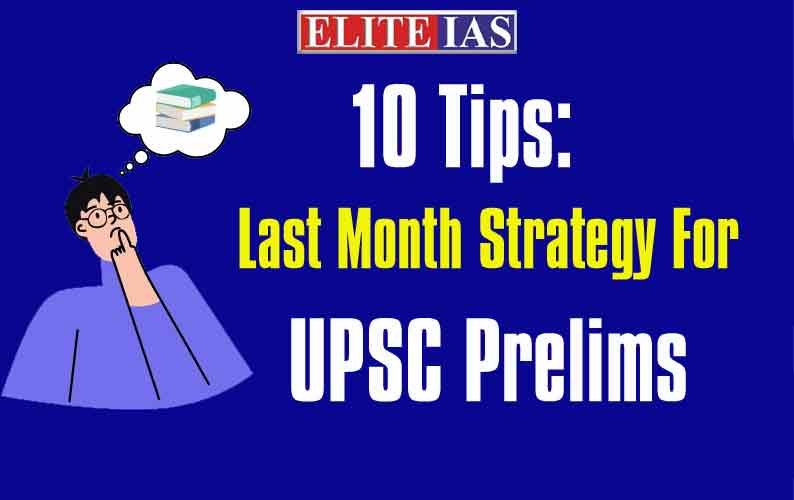
Strategy For UPSC Prelims: The UPSC Civil Services Preliminary Examination is a crucial step for aspirants aiming to pursue a career in the prestigious Indian Civil Services. With its vast syllabus and competitive nature, effective preparation strategy becomes imperative, especially in the last month leading up to the exam. This period demands smart and focused efforts to maximize one’s chances of success. Many UPSC classes in Delhi involve in such focused preparation.
Here, we present 10 invaluable tips tailored specifically for the final month’s preparation for the UPSC Prelims. These strategies are designed to streamline your efforts, boost your confidence, and ensure that you’re well-equipped to tackle the challenges posed by this demanding examination.
1. Previous Year Papers Analysis: Strategy For UPSC Prelims
Studying old UPSC exam papers is super helpful, especially when you’re getting close to the exam day. These papers give you a lot of useful info about the test format, the types of questions you’ll face, and which topics are more important. You can find previous years’ questions from UPSC website or any UPSC online coaching website.
By going through these papers, you get a good idea of what the real exam will be like. Solving them also helps you spot the same kinds of questions that pop up often, so you can focus on those areas. It’s not just about getting used to the test style, though. Working on these papers also helps you get better at solving problems and managing your time during the exam.
It also boosts your confidence because you know you’ve put in the effort to learn from past exams. So, looking at old exam papers is a key part of getting ready for the UPSC exam and can really improve your chances of doing well.
2. Revision Schedule:
With the exam date looming, it becomes imperative to organize a well-structured timetable. This revision schedule should be tailored to suit individual strengths and weaknesses.
Begin by allocating specific time slots for each subject and topic. This segmentation ensures a balanced coverage of the entire syllabus. However, it’s essential to prioritize areas that require more attention. For instance, if you find yourself struggling with certain topics or subjects, allocate more time to revise and understand them thoroughly.
Furthermore, ensure that your revision schedule allows for comprehensive coverage. While focusing on weaker areas, do not neglect the topics you are already proficient in. Revisiting them reinforces your understanding and helps in retaining crucial information.
By adhering to a disciplined revision schedule, candidates can effectively utilize the last month before the UPSC Prelims exam to consolidate their knowledge and enhance their chances of success.
3. Mock Tests and Practice:
Regularly engaging in mock tests and practice sessions is crucial for effectively evaluating your level of preparation and enhancing your exam-taking abilities. It’s imperative to allocate time for both full-length mock tests and sectional tests to replicate the conditions of the actual exam environment. You can also join some best test series for UPSC with limited test papers.
Following each test, take the time to thoroughly analyze your performance, pinpointing any weak areas or concepts that need improvement. By identifying these areas, you can then dedicate focused efforts towards strengthening them, whether through targeted study sessions or additional practice. Ultimately, this systematic approach not only helps in gauging your progress but also equips you with the necessary skills and confidence to perform well on the actual exam day.
4. Current Affairs Review:
Keeping up with what’s happening in the world is really important, especially if you’re getting ready for UPSC exams. These exams really focus on how much you know about current events. So, it’s vital to set aside some time every day to catch up on the latest news. This helps you stay knowledgeable about what’s going on in society and politics.
Using reliable sources is key here. Websites like the Press Information Bureau (PIB), run by the government, give you accurate info directly from the authorities. This helps you understand government policies and announcements better.
Newspapers are also super helpful, especially their opinion sections. They give you different viewpoints on important events and policies. And don’t forget about news analysis platforms that dive deep into current issues. Using all these different sources helps you get a well-rounded understanding of what’s going on, which is crucial for doing well in the UPSC exams.
5. Mind Mapping and Visual Aids:
Utilizing mind mapping and visual aids is a powerful strategy to prepare for UPSC Prelims, especially when reviewing last month’s material. Mind maps, diagrams, and flowcharts offer concise summaries of complex topics, facilitating better comprehension and retention.
By condensing information into visual representations, you can easily grasp interconnected concepts and relationships. Incorporating colors, symbols, and keywords enhances the visual appeal of your notes, making them more engaging and memorable. These techniques not only aid in understanding but also streamline revision, allowing you to quickly review essential points before the exam.
Additionally, the act of creating visual aids reinforces learning by requiring active engagement with the material. Thus, incorporating mind mapping and visual aids into your study routine can significantly enhance your preparation for the UPSC Prelims, ensuring comprehensive understanding and effective recall of crucial topics.
6. Resist New Information:
As you approach the final stages of your study plan, it’s crucial to resist the temptation to introduce entirely new topics. This is not the time to overwhelm yourself with fresh information that could potentially distract you from mastering the material you’ve already covered. Instead, focus on consolidating your existing knowledge base.
Take the time to thoroughly review and reinforce the core concepts that are fundamental to your subject matter. By doing so, you can deepen your understanding and build a strong foundation upon which to tackle exam-style questions effectively.
Concentrate on refining your skills in applying these concepts to various scenarios, honing your problem-solving abilities, and familiarizing yourself with the format and structure of the exam. By prioritizing consolidation over the introduction of new information, you can maximize your chances of success on exam day.
7. Focus on Fundamental Concepts:
As the exam period draws near, the emphasis has been placed on intensifying comprehension of fundamental concepts across a spectrum of subjects. This strategic approach aims to fortify individuals’ foundational knowledge, thereby enhancing their preparedness for a diverse array of exam questions.
In this regard, particular attention has been directed towards prioritizing key subjects such as History, Geography, Polity, Economy, and Science & Technology. These subjects have been singled out due to the propensity for exam questions to revolve around conceptual understanding rather than mere rote memorization. To facilitate success in navigating these concept-based inquiries, individuals have been encouraged to cultivate clarity on basic principles, theories, and historical events within each subject domain.
By doing so, they can confidently tackle exam questions with precision and accuracy, drawing upon a robust understanding of the underlying concepts. This concerted effort not only fosters academic achievement but also instills a deeper appreciation and comprehension of the interconnectedness of various disciplines.
8. Health and Well-being:
As the final month before the UPSC exams approaches, it’s crucial to prioritize your health and well-being alongside your studies. This period can be intense and demanding, but neglecting your physical and mental health can jeopardize all the hard work you’ve put into preparing.
To maintain peak performance, focus on maintaining a healthy lifestyle. Ensure you’re consuming nutritious meals to fuel your body and mind effectively, staying hydrated to optimize cognitive function, and incorporating regular exercise to reduce stress and increase energy levels.
Equally important is getting enough sleep to allow your brain to consolidate information and recharge. Furthermore, actively manage stress and anxiety by integrating relaxation techniques like meditation and deep breathing exercises into your daily routine. By prioritizing your health during this critical time, you’ll enhance your ability to tackle the challenges of the UPSC exams with clarity and resilience.
9. Stay Positive and Confident:
The last month leading up to the UPSC exam can be a whirlwind of emotions. It’s natural to feel anxious or overwhelmed by the sheer volume of material. However, during this crucial period, staying positive and confident in your preparation is paramount. This doesn’t mean ignoring any nervousness you might feel, but rather acknowledging it and choosing to focus on your strengths.
Believe in your ability to recall the information you’ve diligently studied for months. Spend some time each day visualizing yourself succeeding in the exam hall, calmly and confidently tackling each question. Remind yourself of the dedication and hard work you’ve invested so far.
This unwavering trust in yourself and your preparation will be a powerful tool that will see you through the exam and beyond. Remember, a positive attitude can significantly impact your performance, so choose to focus on the success you’ve earned.
10. CSAT Deserves Attention:
Don’t underestimate the importance of the CSAT (General Studies – CSAT) section! This exam goes beyond memorizing facts and tests your core analytical and reasoning abilities. Don’t make the critical mistake of neglecting it. To excel, make practicing past CSAT papers a priority.
This will familiarize you with the question formats and hone your critical thinking skills. Once you’ve gotten a feel for the test, identify your weaker areas within CSAT. This might be comprehension of passages, making sound decisions, or tackling problems.
The last month before the UPSC Prelims is a critical period where strategic preparation can significantly impact success. The 10 tips provided offer a roadmap for focused revision, stress management, and exam-taking strategies. By implementing these tips, aspirants can optimize their efforts, boost confidence, and maximize their chances of cracking the exam. With perseverance and determination, success in the UPSC Prelims becomes an achievable goal, leading the way to a promising career in the Indian Civil Services.





